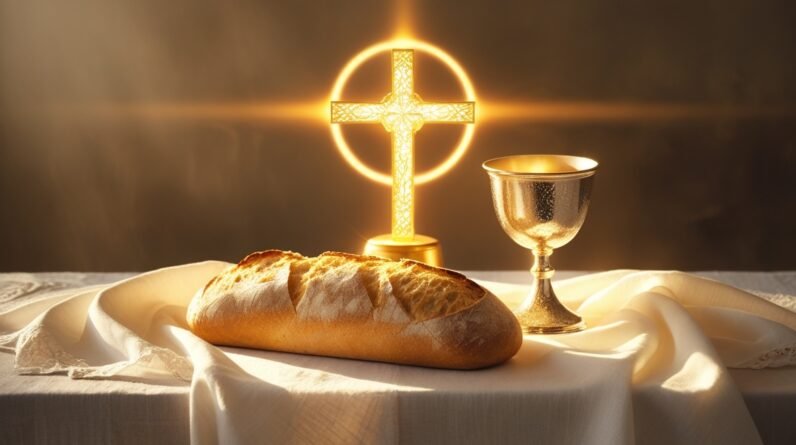Why Communion Is More Than Just Bread and Wine
When you walk into a worship service and see the elements set out—the bread and the cup—you might feel a familiar tug: this is a ritual you’ve been taught to observe, a regular rhythm of Christian life. But the Meaning of communion runs much deeper than a weekly custom. It’s an invitation to remember, to belong, to be nourished, and to be sent. In this article, you’ll explore why communion is more than just bread and wine, how Scripture anchors its meaning, how different practices shape its expression, and how you can approach it with greater clarity and spiritual depth.
The Biblical Foundation: Where Communion Comes From
The roots of communion are planted in Jesus’ last meal with his disciples. When he took the bread and the cup, he redefined a meal as a way to remember and proclaim his saving work. The clearest account of this command comes through Paul’s retelling of Jesus’ words: “For I received from the Lord what I also passed on to you: The Lord Jesus, on the night he was betrayed, took bread… This is my body… This cup is the new covenant in my blood; do this, whenever you drink it, in remembrance of me” (1 Corinthians 11:23-26). You’re standing on a practice rooted directly in Jesus’ instruction.
Luke’s gospel gives a similar picture: Jesus took bread, gave thanks, broke it, and said, “This is my body given for you; do this in remembrance of me” (Luke 22:19-20). Matthew records the same night and words, emphasizing the covenantal nature of the cup (Matthew 26:26-29). These passages show you that communion is rooted in remembrance and proclamation—both inward and outward acts of faith.
The Meaning of Communion as Remembrance
When you hear the word remembrance in the context of communion, don’t reduce it to mere memory. The Meaning of communion as remembrance is active, embodied, and communal. Jesus doesn’t merely say, “Think about me.” He gives a tangible act—eat and drink—so that the memory will be enacted in your body and in the life of the community. Every time you participate, you’re invited to remember Jesus’ life, death, and resurrection in a way that engages more than your intellect.
This is important because embodied practices shape how you live. Remembering through taste and touch anchors the gospel in your physical existence. The apostle Paul emphasizes that communion proclaims the Lord’s death until he comes, making the act a living reminder of the gospel’s central event (1 Corinthians 11:26). When you approach communion, you’re entering into a story that’s meant to transform your present by tethering it to Christ’s work.
Communion as Fellowship and Unity
The Meaning of communion also centers on fellowship—the deep, sometimes messy unity you share with other believers. Communion is a communal meal; it’s not a private devotional. The early church “devoted themselves to the apostles’ teaching and to fellowship, to the breaking of bread and to prayer” (Acts 2:42). That phrase “breaking of bread” captures a rhythm of life where believers meet, share meals, and practice faith together.
Paul helps you see the theological dimension of that fellowship. He writes of the cup of blessing being a participation in the blood of Christ and the bread we break being a participation in the body of Christ, making the church one body even as you share that one loaf (1 Corinthians 10:16-17). When you take communion with others, you’re not only remembering Jesus—you’re acknowledging that you belong to one another in him. It’s a moment that both celebrates unity and calls you to live it out beyond the table.
Spiritual Nourishment: More Than Symbolism
One of the most powerful ways people experience the Meaning of communion is as spiritual nourishment. Jesus used eating language explicitly when he said, “I am the bread of life. Whoever comes to me will never go hungry” (John 6:35). In the same chapter, he goes further: “Whoever eats my flesh and drinks my blood has eternal life” (John 6:53-56). Those words are difficult and intentionally provocative, pointing you to a spiritual reality that transcends mere symbolism.
Different Christian traditions interpret this differently—some emphasize a real, mysterious presence of Christ in the elements; others emphasize strict symbolism. Whatever your tradition, you can’t deny that communion is meant to feed your soul. It’s a sacramental way in which grace is appropriated by faith. When you receive the bread and cup, you’re formed into a people whose life is sustained by Christ.
The Proclamation: Until He Comes
The Meaning of communion is also prophetic. When Paul says “For whenever you eat this bread and drink this cup, you proclaim the Lord’s death until he comes” (1 Corinthians 11:26), he’s saying that the act of communion points forward as well as back. You’re not only commemorating a past event—you’re making a public declaration about the hope of the future.
Every celebration of the Lord’s Supper is a small foretaste of the feast to come. As you eat and drink, you declare your allegiance to King Jesus and your hope in his return. That proclamation shapes your priorities and calls you to live in light of the coming kingdom. Communion becomes a stabilizing horizon, an eschatological reminder that your present practices matter in the story that culminates in Christ’s return.
How Communion Shapes Christian Identity
When you participate in communion, you’re participating in identity formation. The act of taking bread and cup tells you who you are: a forgiven, reconciled, and sent member of Christ’s body. Paul’s admonition to examine yourself before partaking underscores this identity dimension: he warns against taking the bread in an unworthy manner, because doing so has spiritual consequences (1 Corinthians 11:27-29). You’re called to come as repentant people, aware of your need for grace.
At the same time, communion shapes communal identity. It’s a sign that you belong to a people marked by love and service. Jesus connected the meal with a command to love one another: after washing the disciples’ feet he said, “A new command I give you: Love one another. As I have loved you, so you must love one another” (John 13:34-35). Because communion unites you to Christ, it also binds you to one another in a community defined by sacrificial love.
Preparation: How You Should Approach Communion
You probably want practical guidance: how do you prepare to take communion in a way that honors its meaning? The Bible encourages self-examination and repentance before coming to the table. Paul’s warning in 1 Corinthians (about eating and drinking in an unworthy manner) calls you to reflect on your relationships and your conscience (1 Corinthians 11:27-29). Psalm 51 gives a model of confession and seeking a clean heart: “Create in me a pure heart, O God” (Psalm 51:10).
Here are a few practical steps you can take when preparing for communion:
- Pause and pray briefly, confessing the things that separate you from God and others.
- Reflect on the gospel: Christ died for you, was raised for you, and remains present with you.
- Reconcile with others where possible—communion is about fellowship, and unresolved conflict undermines that witness.
- Approach with gratitude and expectation, ready to receive spiritual nourishment.
These steps aren’t a checklist for earning favor, but a means of entering the meal with a heart aligned with its meaning.
Communion and Corporate Worship: Why You Need the Community
Communion is designed to be celebrated in community. The New Testament repeatedly connects the Lord’s Supper with the gathered life of the church. Acts shows the early believers devoting themselves to fellowship and the breaking of bread (Acts 2:42), and Hebrews urges you not to neglect assembling, especially as you encourage one another toward love and good deeds (Hebrews 10:24-25). Communion, then, is a central act of corporate worship that both expresses and forms communal faith.
When you share the elements in a congregation, you participate in a visible sign of the invisible unity of the church. That’s why communion can’t be reduced to a private devotional exercise without losing essential meaning. It’s an act that embodies your belonging and sends you back into the world as a witness to Christ’s love.

Different Theological Perspectives: Symbol, Presence, and Everything Between
You’ll encounter several theological understandings of communion across Christian traditions. Broadly speaking, views fall along a spectrum:
- Symbolic: The elements are memorial symbols pointing to Christ’s death. The emphasis is on remembrance and proclamation.
- Real presence: Christ is truly present spiritually or mysteriously in the elements, nourishing believers.
- Consubstantiation or sacramental union (common in some traditions): The elements are both bread and wine, and also convey Christ’s presence in a unique sacramental way.
Each of these positions seeks to safeguard an important part of the Meaning of communion: remembrance, transformation, and participation. The differences matter for theology and practice, but they shouldn’t drive you to suspicion of fellow Christians whose emphasis differs from yours. Remember that the main thing is the main thing: Jesus commanded a meal of remembrance and unity, and the church has long wrestled with how best to honor that command.
Communion as a Means of Grace, Not Magic
You likely want clarity about whether communion does anything on its own. The Bible does present communion as an encounter with grace, but it never presents the elements as magical objects that operate apart from faith. You’re called to receive the bread and cup with faith, repentance, and dependence on God. That’s why Paul emphasizes the danger of taking the Lord’s Supper in an unworthy manner—because sacramental acts can become spiritually harmful if received without faith (1 Corinthians 11:27-29).
Communion is thus a means of grace—a tangible channel through which God meets and strengthens you. It’s a divine gift that requires your receptive posture. You don’t earn salvation by the ritual; you receive nourishment and reorientation by faith.
Communion and Social Justice: Your Table Extends to the World
If the Meaning of communion is about unity and the body of Christ, it naturally spills over into how you treat the vulnerable. Jesus’ life and death were not only about personal forgiveness but about a renewed order where the last are first. When you sit at the Lord’s table, you proclaim a kingdom where justice and mercy are central. Matthew’s teaching about caring for “the least of these” connects kingdom faith to tangible care for others (Matthew 25:35-40).
Communion is a prophetic reminder that you’re called to embody the table’s hospitality in the world—feeding the hungry, welcoming the stranger, and seeking justice for the oppressed. The sacrament should make you more sensitive to the needs around you, not less. It’s a reminder that the gospel’s feast ultimately points toward a world reconciled under Christ’s reign.
Pastoral Cautions: Avoiding Legalism and Exclusivism
You should be wary of two extremes when it comes to communion: legalism and exclusivism. Legalism turns communion into a performance—rules and rituals that become ends in themselves. Exclusivism, on the other hand, can use communion to exclude and control, denying table fellowship to those who need grace most. Paul calls the Corinthian church out for behaviors that distorted the meal into an occasion of division rather than unity (1 Corinthians 11:17-22). The corrective was both theological and pastoral.
You’re called to balance a reverent approach with a generous spirit. The table invites repentance and self-examination, but it also invites those who recognize their need for mercy. Churches must wrestle honestly with how to practice boundaries (for teaching integrity and pastoral care) without turning the table into a club for spiritual elites.
Communion in Practice: Small Groups, Homes, and Services
You may wonder how communion fits into everyday Christian life. While Sunday services are a common time for the Lord’s Supper, the practice is adaptable. The early church shared meals in homes and in corporate gatherings. Communion in small groups or homes can be deeply formative because it tends to be relational and intentional.
When you celebrate communion in a smaller setting, emphasize the biblical practices: remember Jesus’ words, give thanks, break the bread, and drink the cup in remembrance and proclamation (Luke 22:19-20). Use the opportunity to confess, encourage, and pray. Such settings can complement corporate worship by making the sacrament a tangible expression of everyday fellowship.
Children and Communion: Teaching and Discerning
How should you involve children in communion? Different churches handle this differently. Some welcome baptized children to the table as a sign of covenant inclusion; others wait until a public profession of faith. Whatever you decide for your context, the Meaning of communion should be taught to children not as a secret ritual but as a story of God’s love, a meal of grace, and a sign that God is making a people.
Teach kids honestly: the bread and cup point to Jesus’ life, death, and resurrection. Use simple language and stories, include prayers of thanks, and help them see the connection between the table and loving others. The goal is formation, not merely instruction—help them grow into thankful participation.
The Table as Formation: Communion Shapes How You Live
One of the most profound things about communion is that it forms you over time. If you take the sacrament regularly with understanding, you become a person whose imagination is shaped by the gospel. The Meaning of communion is not limited to the moment you chew the bread; it reaches into your daily life. You’re reminded of grace, called to reconciliation, and sent to love.
Romans exhorts you to offer your bodies as a living sacrifice, transformed by the renewing of your mind (Romans 12:1). Communion contributes to that formation. It helps you reorient your desires, align your priorities, and practice sacrificial love.
When Communion Is Difficult: Grief, Doubt, and Distance
There will be seasons when approaching the Lord’s Table feels hard—times of grief, doubt, or separation from a church body. In grief, the cup may remind you of loss. In doubt, the words can feel heavy or strange. If you’re physically distant from a church, you might miss the corporate aspect. These are real struggles, and the Meaning of communion remains significant in each.
If you’re grieving, let the table be a place to bring that pain honestly before God. If you’re in doubt, use communion as a practice of honest faith: come with questions, not pretense. If you’re away from a community, find ways to participate spiritually—prayer, Scripture, and seeking fellowship where possible. Remember that the Lord’s table is both a place of vulnerability and grace.
Practical Questions: Frequency, Elements, and Accessibility
You probably have practical questions: How often should your church celebrate communion? What elements should you use? Who should be invited? Practices vary widely. Some churches celebrate weekly; others monthly or quarterly. Some use unleavened bread, others use regular bread; some use wine, others grape juice. The core principle is fidelity to Scripture’s meaning: remembrance, fellowship, nourishment, and proclamation.
Accessibility matters. Ensure that people with allergies, disabilities, or other needs can participate meaningfully. Hospitality at the table is part of the witness: if your communion practice inadvertently excludes people, you’re undermining the gospel the meal proclaims.
Bringing Communion into Daily Life
The Meaning of communion isn’t confined to the moment of the meal. You can carry its rhythms into daily life: gratitude at mealtimes, small acts of reconciliation, and regular reflection on the cross. You don’t need to replicate the sacrament to do this; rather, let the sacrament shape how you live. Simple practices—pausing to give thanks before eating, practicing forgiveness, serving a neighbor—are ways the table’s meaning spreads into your everyday world.
Communion trains you to notice dependence—on God, on others—and to practice hospitality. It keeps you humble and hopeful, grateful and missional.
Conclusion: A Living, Transforming Practice
As you’ve seen, the Meaning of communion is rich and multifaceted. It’s remembrance, fellowship, spiritual nourishment, proclamation, formation, and mission. It’s not merely bread and wine; it’s a living practice meant to shape you into a person rooted in Christ and overflowing with his love. Whether you approach the table weekly or less often, do so with expectancy: this is an encounter with grace that forms your identity and sends you into the world.
Take these truths into your next communion and let the elements be more than ritual—they’re an embodied sermon, a communal promise, and a foretaste of the heavenly feast to come.
Explore More
For further reading and encouragement, check out these posts:
👉 7 Bible Verses About Faith in Hard Times
👉 Job’s Faith: What We Can Learn From His Trials
👉 How To Trust God When Everything Falls Apart
👉 Why God Allows Suffering – A Biblical Perspective
👉 Faith Over Fear: How To Stand Strong In Uncertain Seasons
👉 How To Encourage Someone Struggling With Their Faith
👉 5 Prayers for Strength When You’re Feeling Weak

📘 Jesus and the Woman Caught in Adultery – Grace and Mercy Over Judgement
A powerful retelling of John 8:1-11. This book brings to life the depth of forgiveness, mercy, and God’s unwavering love.
👉 Check it now on Amazon
🌍 “Every great message deserves a home online.”
Don’t let your calling stay hidden. Start a Christian Blog/Website using Hostinger — with 99.9% uptime, free domain, and SSL, your voice can shine for God’s glory anytime, anywhere.
👉 Begin today. Try it RISK-FREE!
“Your body is God’s temple — care for it with purpose.”
Renew your energy and restore balance the natural way. Mitolyn helps support a healthy metabolism, giving you the vitality to live out God’s calling with strength and confidence.
🌿 Unlock Your Metabolic Power. Burn More Calories & Feel Great With Mitolyn.
👉 Start Today. Check Price Now.
As a ClickBank & Amazon Affiliate, I earn from qualifying purchases.
Acknowledgment: All Bible verses referenced in this article were accessed via Bible Gateway (or Bible Hub).
“Want to explore more? Check out our latest post on Why Jesus? and discover the life-changing truth of the Gospel!”






